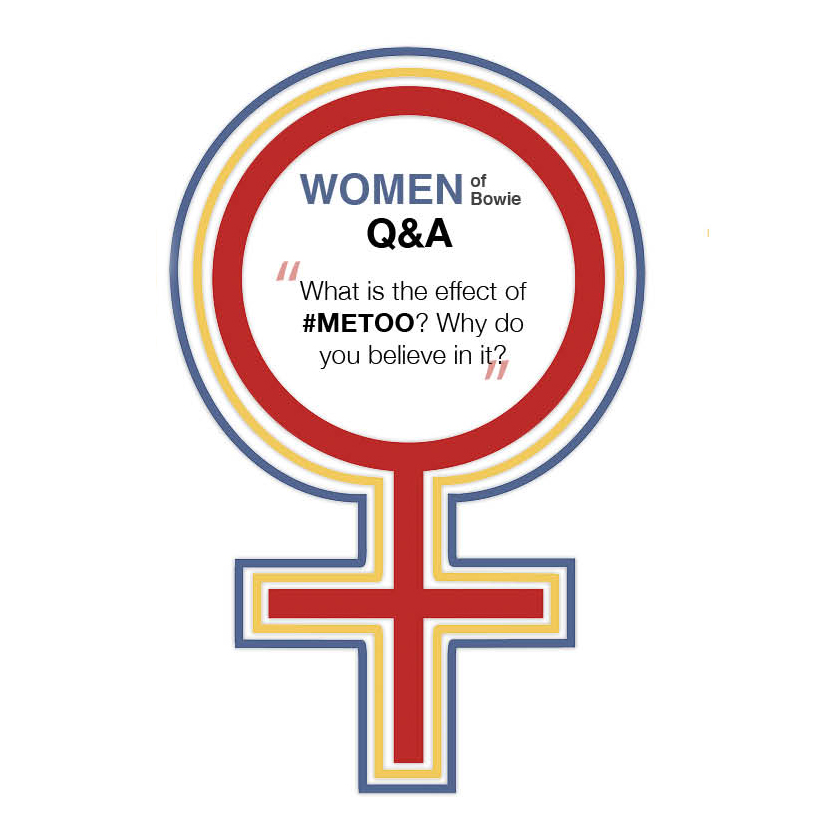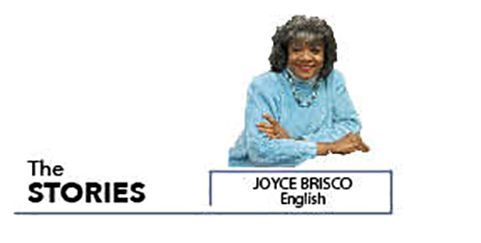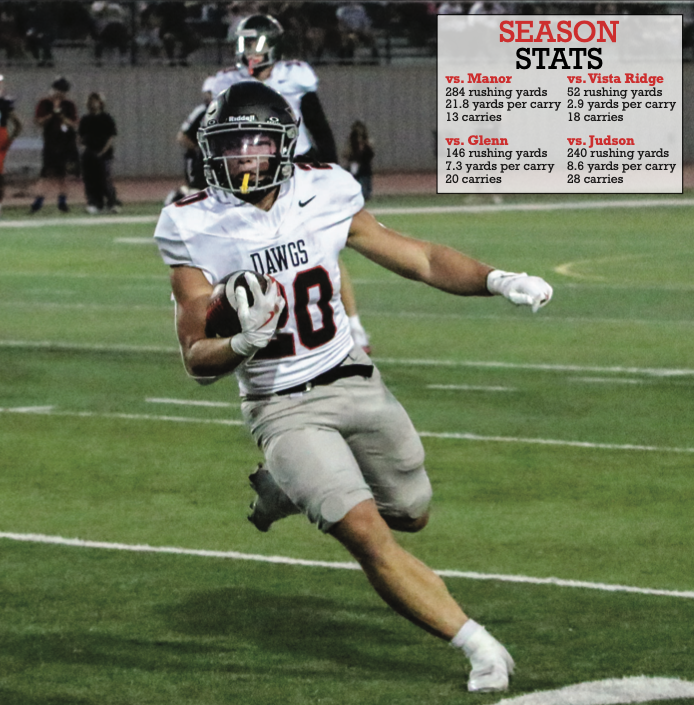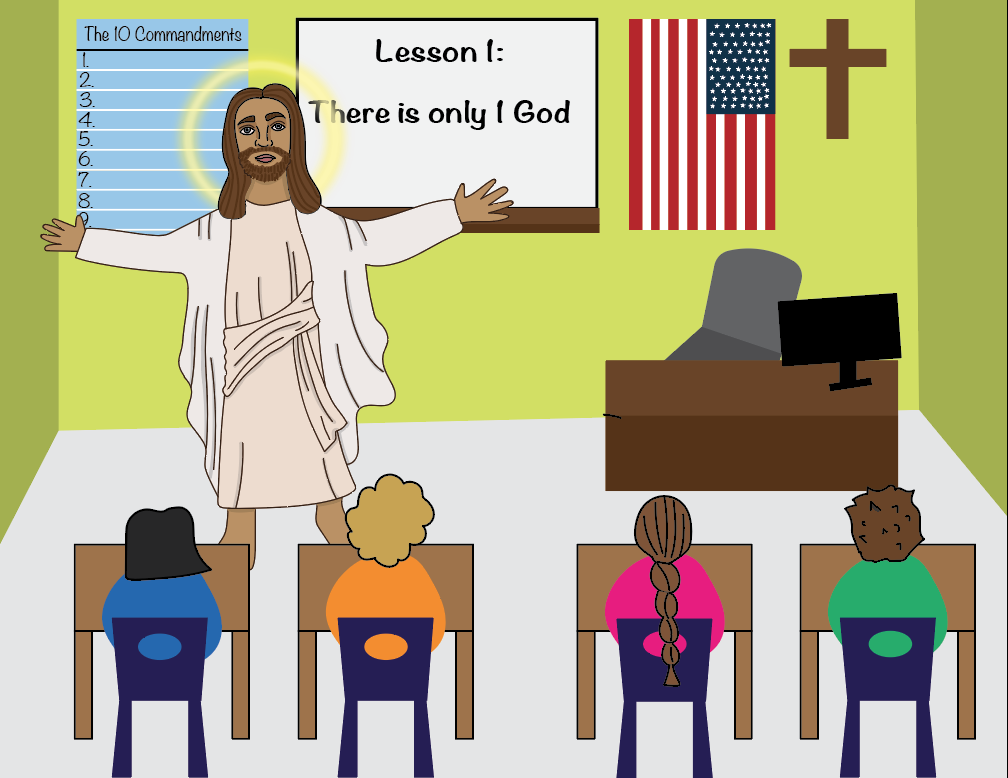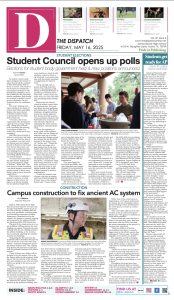#MeToo
March 6, 2018
A wave of sexual misconduct allegations and stories of harassment against men of power have moved women across the world to take a stand against years of unequal, unjust treatment. This movement has built up incredibly as the empowering voices of females, young and old, expressing their time as victims has come to an end.
The #MeToo movement, sparked by a tweet made by actress Alyssa Milano to help give voice to sexual assault victims, began not only as women in the media speaking out about their unfair treatment, but a chance for all women to now have a voice of their own.
“The movement has opened the doors and paved the way for women to be brave, courageous and empowered in their speaking out against a long-standing, unspoken culture of harassment,” English teacher Amanda Pfeiffer said.
Originating from the many allegations against Harvey Weinstein, the movement was a shock to the world by giving light on the hidden horrors of the workplace between all genders and the constant fear of women’s reputation being tainted for speaking out against a person of power.
“We, as a nation of people, cannot problem solve, listen, discuss, and come up with honest, fair solutions if we do not acknowledge that problems exist,” academic dean Susan Leos said.
This is not a gender-constrained movement. With a focus on women, #MeToo also includes all races, genders, and sexualities, letting everyone’s voice in to form a unity of empowerment.
“I think the focus is on women, which is great, because I think a lot of the time our voices are kind of suppressed in our society,” geometry teacher Deepthi Ramachandran said. “It does affect more women than men, but it’s still both genders.”
Through platforms such as social media, the web has given opportunity for women who have endured through unfair treatment to join together across the world as well as go against the unrealistic standards a consumer society imposes.
“In all its ubiquity, the Internet has yielded some positive results for young women,” Pfeiffer said. “It has bound them together and encouraged like-minded women to build each other up and stand up against false campaigns for beauty and self-esteem that are designed to disparage and encourage constant consumerism.”
Unfortunately, people who share their stories are also being attacked through anonymous or fake accounts from either people they do or do not know.
“I have friends who are still being harassed from people on social media,” art teacher Mindy Le Jeune said. “They know who harasser is and they have tried to stop it by contacting the social media platform, but the person finds another username and starts again.”
Half of the time, these threats and criticism is coming from other women towards the victim sharing her story.
“As women, I believe that we must stick together to support survivors of sexual abuse, violence, and misconduct,” senior Anna Seningen said. “I believe that a woman should never put another woman down for speaking up about her stories of abuse.”
One issue arising from the movement is the term “feminist” and what that truly means in the eyes of people who may not fully understand or may misinterpret it.
“Men and women alike do not realize that being a feminist does not mean that you believe that women are superior to men,” Seningen said. “It means that you support the complete and total equality of men and women in every situation of life.”
This moves into understanding what it means to be a woman and what may not be comfortable or consensual for them.
“Men have a responsibility to acknowledge and try to understand perspectives foreign to them so they can act more sensibly,” senior David Goeller said. “Behavior like this often arises from ignorance towards others and one’s self, as well as ignorance of the consequences of one’s actions.”
When people do not take into consideration their actions is when innocents become victims.
“I was at a friend’s birthday downtown and there was a guy sitting at a table on the side of the street and coughed the word slut as I walked by,” sophomore Kendall Johnson said. “I had never had that experience before until that moment and I felt super powerless because I hadn’t done anything to that man to call me that, nothing I did could’ve made that man call me a term like that.”
Comments made like in Johnson’s case leaves an impression on the individual that can create far worse effects on self-esteem or mental-health.
“As a woman, I have always been baffled at how men, not all men, have had the capability to address a woman in a manner in which could ruin their whole evening,” senior Natalie Haddad said. “Any time a complete stranger insists on telling me I ‘look sexy’ or have any kind of potential to ‘get some’, it truly ruins my whole evening and I’m then in fear of any other kind of unwanted attention.”
In a lot of cases involving teenagers, young men feel a type of entitlement towards being able to act the way they want towards women which is one of the biggest things #MeToo is trying to shake away.
“I’ve been looked at as dumb or not capable just because of my sex and discriminated against because of the color of my skin,” senior Nya Martin said. “I’ve dealt with countless boys who felt that they were entitled to my attention and time and as soon as they get rejected they try to insult and harass me.”
At times, female teachers are treated unfairly by students just because of their gender and have to work towards receiving equal treatment and respect.
“As a woman, and a tiny one at that, I have had students try and test me,” English teacher Bree Rolfe said. “There is a period at the start of every school year where I have to work to get respect perhaps a little more than a male teacher.”
Even during times when feminist movements like the nineties’ “Riot Grrls”, harassment and discrimination made a home amongst the punk wave; something the “riot grrls” were fighting against.
“Before I was a teacher, I wrote about music as a journalist,” Rolfe said. “I experienced some encountering editors or musicians who treated me like I didn’t have the same music knowledge as my male coworkers.”
In these situations, it’s difficult for women to find the courage to speak up towards a perpetrator with power from fear of losing their job, losing respect, or not having support to back them up; this being the reason the #MeToo movement began in the first place.
“You think about it later on and wonder why someone would say that when they wouldn’t say that to a male coworker who’s on my same level,” Ramachandran said. “When something like that happens to me, it’s almost like taking your power away.”
This leads into the fight for equal pay and how positions mostly taken on by women (teaching, nursing, child-care) have somewhat lower incomes than more male-driven occupations.
“Historically, I think our country has not always put financial worth into any profession seen more as ‘women’s work’,” Leos said. “The pay is not the same in comparison with other fields that employ more men than women.”
The #MeToo movement has sparked questions and controversy around why there is such thing as “women’s work” and how that moved certain men toward feeling they have the power to manipulate and disrespect the opposite sex.
“I believe education is the root of everything,” Ramachandran said. “Never are men told ‘don’t rape women’ or ‘don’t whistle at a woman down the street’ or ‘don’t approach a woman when she’s by herself and make her feel uncomfortable’.”
Awareness of problems in the health education system has also been revealed through the movement, including how relationships between men and women work and the way these relationships work.
“The last school I worked at, this health teacher said something along the lines of ‘boys, if you get drunk at a party, you might have sex with a girl who you think at the moment is a ten and when you sober up you find out she’s actually a five’,” Ramachandran said. “I’ve never been so horrified.”
Teachings like so have been rooted into society and have slipped under the radar, further creating an unequal view toward women.
“There’s a lot of things wrong with that statement: that a girl considered a ten are the only ones worthy of having a sexual relationship; assuming that a man is the only person that has a say in that situation is kind of what is communicated there,” Ramachandran said. “He was teaching fourteen year old boys that this is what life is like.”
Next to education in schools, education at home involving parenting has been a factor considered in the debate between “nature versus nurture” on the way men view and treat women.
“Sometimes our own ways of raising children predispose both girls and boys and then both groups suffer,” Leos said. “You know, all the folks who say boys should not be interested in dance and girls will never be any good at math.”
Universal sayings presented to young children of both genders leaves an impression that is a start to inequality, even something that seems simple or innocent.
“The age-old line of thinking that a boy who picks on a girl does so because he likes her is still flying around and I am sick of it,” Rolfe said. “I have a four-year-old niece and it starts even in preschool. We’re teaching her that sometimes people who like us hurt us.”
Gender roles and stereotypes in relationships also has created difference between women and men, further pushing men to an imaginary “higher-standard”.
“Women are taught to be more affectionate and men are taught to be kind of more hard in their feelings and ‘it’s not cool to show their feelings because they’re men’,” Ramachandran said. “There’s this kind of parody between the way a someone is supposed to act and what they see people of their same gender do.”
This “higher-standard” mind-set creates a superiority factor within men when compared to women.
“Growing up in the world today, social constructs push this idea upon people that being a man puts you at an advantage,” senior Julian Haddad said. “I believe some people foolishly take this mentality to heart and treat women unfairly because they believe their genitalia gives them a free pass to do so.”
This thus proves a feeling of “power” or “superiority” isn’t just from men in a high position, but also resides in young male students towards young women who are equal to them.
“When students need help, there are some boys who will just interrupt me when I am having a conversation with a female student or cut in front of them to talk to me,” Rolfe said.
A lot of times, the actions born from stereotypes or wrong-teachings go under the radar from victims being too scared to speak up.
“We do not always know about all the instances either because students who are victims often do not tell authorities,” Leos said.
At Bowie, there is a policy in place to deal with accusations of harassment between any students, regardless of gender.
According to counselor Laura Loza, the first step is for students to come to a trusted counselor and report the someone that has made them feel uncomfortable or treated them in any disrespectful manner.
After the counselor has been fully informed of the misdemeanor, the statement is then transferred to the student’s assistant principal with the help of the school resource officers.
“Disciplinary action is usually taken on the perpetrator,” Loza said. “The administrator may have to enact a ‘no contact agreement’ in which both parties sign or even have to file a Title IX report.”
To ensure things are dealt with properly, administrators and teachers are required to learn the process and what must be done when students approach them about a misconduct or situation.
“Administrators and teachers are required to attend trainings and professional development, and I think our staff takes it seriously,” Leos said.
Now that the #MeToo movement has shed light on the unequal and unjust treatment of women in every standpoint and position, it is now a matter of what will be done to prevent such happenings from occurring anymore.
“Changing the way people act is a tough way to look at solving the problem as people tend to be very stubborn,” Julian said. “But, I believe a mindset of mutual respect, peace, love, and positivity could help foster a new age without these terrible scenarios of assault and harassment.”
Moving the attention towards the perpetrator is one step towards focusing on getting justice and prevention from more unequal treatment.
“I think that the solution to this is focusing on the offender and not the victim,” Martin said. “Instead of women being told to be modest and careful, men should be taught that women are not their property and women are allowed to make decisions for themselves.”
Another possibility is to keep pushing the idea of feminism and what that truly means to the public.
“I personally will not stop pushing the idea of feminism until women are paid just as much as a man is for the same exact job, until women are seen as more than just an object, and until every woman feels that she is just as powerful, as strong, and as equal as a man feels,” Seningen said.
There’s also the aspect of the people in power backing up movements like feminism and #MeToo for if they speak out on it, others will follow.
“The powerful people have to stand up for the little guys,” Ramachandran said. “As a woman and a minority, I can fight as hard as I want to, but the white man is the voice that people listen to right now.”
The people in power who are getting away with unfair treatment towards the opposite or same sex is where accountability needs to come in.
“We need to find a way to keep everybody accountable, there needs to be like this circle of accountability rather than this hierarchy of power,” Ramachandran said.
However, to people like Ramachandran, education is where the real change will occur.
“I think the solution is finding a way to educate everyone, educating young people that your generation that can make that step where this won’t be a problem anymore in the workforce and holding people accountable for what’s happening,” Ramachandran said.
In the education system, differentiating opinions on how to educate students on tricky subjects such as gender equality, health education, and healthy relationships are extremely prevalent now.
“How do you educate or teach children about relationships, but then how do you get all parents to consent one of the most important and heaviest topics to talk about it?” Ramachandran said.
Despite there still being a long way to go, the generation of women now will grow with this movement, further pushing towards the respect all genders, races, and sexualities deserve in a society still working towards equality.
“I am so very inspired and humbled by these young women each day and wish, in high school, that I had just an ounce or sliver of the empowerment and unapologetic passion they have,” Pfeiffer said. “What a difference that would have made.”
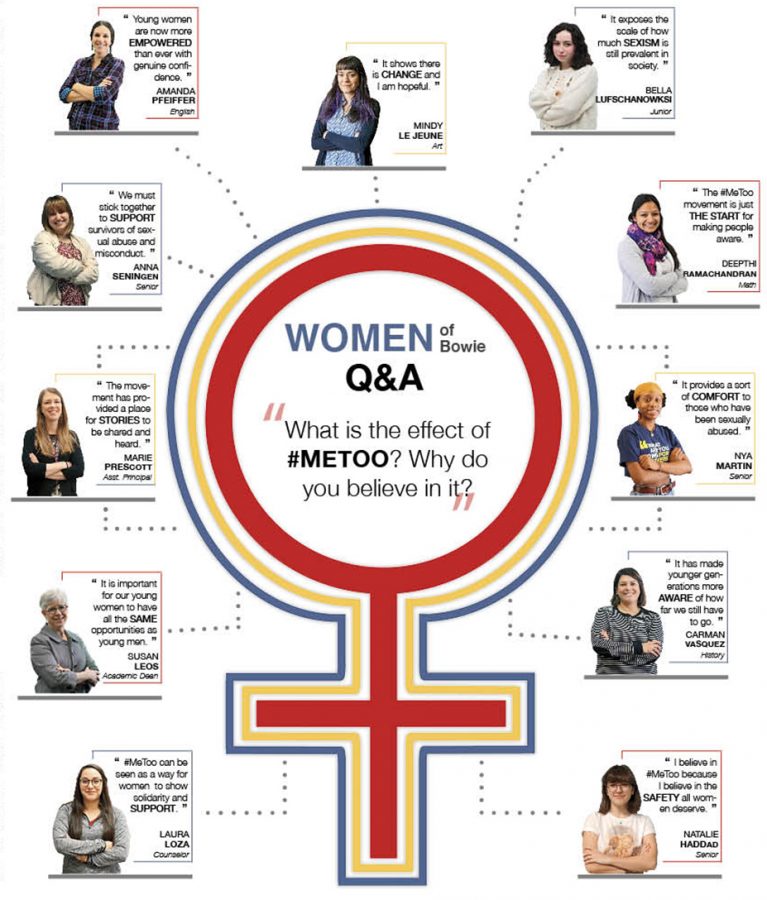 Photo by: Violet Glenewinkel
Photo by: Violet Glenewinkel


